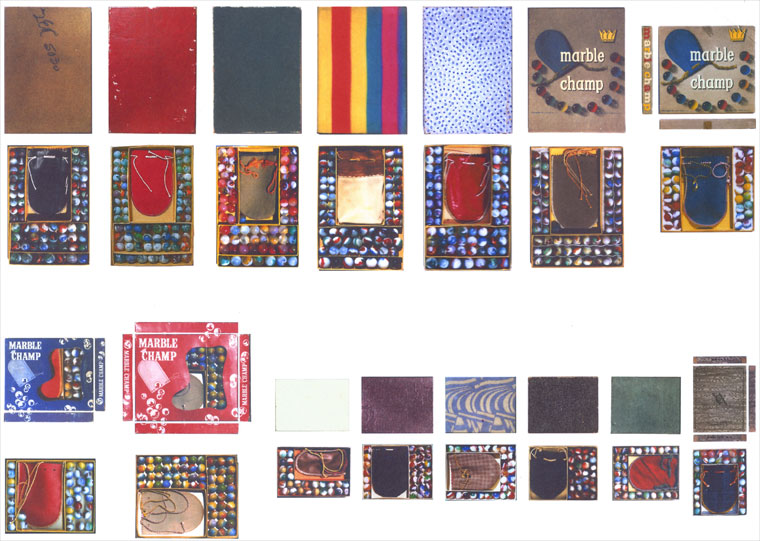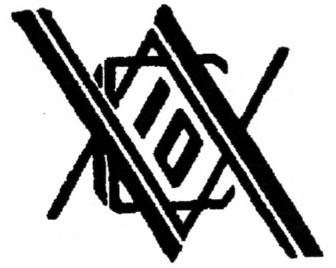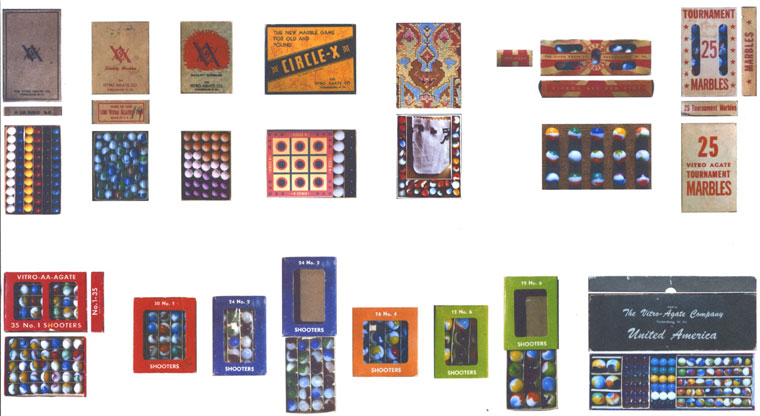

VITRO AGATE COMPANY BOXES
By George Sourlis
A couple of months ago I decided to sort through my more thank 3300
original photos of marbles and marble-related items to find all of those showing
Vitro Agate Company original boxed sets.
I found about 28 boxes. I
then laid out a display using my computer and an imaging program.
I like it so much that I have decided to share it with the marble
collecting community. It’s printed
on the last tow pages of this newsletter.
The arrangement is not wholly in chronological order.
It seemed better to arrange the boxes in groups.
Within each group the boxes are closely related and progress, perhaps not
totally in sequence, from older to newer.
There are 5 groups shown.
The first group contains 9 boxes – 7 in the first row and the first 2 in
the second row. The last 4 are
Marble Champ boxes. The composition
and the layouts of each of the first 5 boxes are just like the first large tan
Marble Champ box. So I think they
are predecessors of that box. The 9
probably represent the evolution of the Marble Champ box from boxes that are
completely anonymous (except that any serious Vitro collector will verify that
the marbles were made by Vitro) to 4 boxes having nice graphics.
Two of these have cellophane windows allowing a view of the contents.
The 2 attractive tan boxes have the company name (Vitro Agate Company)
and location (Parkersburg, W. Va.) in tiny print just below and to the left of
the semicircle of marbles. Both
boxes are numbered just below and to the right of that semicircle: the large one
is No. V110, and the small on is No. V59.
Strangely, the last 2 Marble Champ boxes have no company name or location
shown. This pair is shown in a 1954
Vitro Agate advertisement near the beginning of this newsletter.
None of the bags or inserts in any of the boxes have any printing
whatsoever on them.
The second group of boxes contains the last 6 small ones in the second
row. They are similar in size and
contents. Although the first one
(ivory-colored cover) has only 26 marbles, the other 5 have 28 marbles each.
The first 5 have no company identification (except for the marbles),
while the last wood-grained box has the company name on the top of the cover and
the front lip of the cover. It also
has the company logo shown in Plate 1 below.
This is Vitro’s No. 10 box.
The wood-grain in this example runs vertically; in others it may run
horizontally. The printing is always
in the orientation shown here. I
feel that these 6 boxes represent the evolution of the No. 10 box.
Notice the various orientations of the bag with its insert and the
variety of arrangements of the marbles around them.
There are other arrangements not shown.

PLATE 1 BOX GROUPS 1 & 2

PLATE
2 THE VITRO
AGATE COMPANY LOGO
The third group of boxes contains the 4 boxes showing the Vitro logo.
These boxes are circa 1937.
The game of Chinese Checker was invented in 1937, and the game-marble box has
the logo. It was clearly designed
for the Chinese Checkers game since it has 60 marbles divided into 6 groups of
10 one-color marbles. There is at
least one other Vitro box having the logo that is not shown in the display.
It is a 100-count No. 0 wood-grained box similar to the No. 10 box except
that it has no bag or insert, and it is larger (6-3/4 inches x 6-3/4 inches x ¾
inch).
The last 4 boxes in row 3 are grouped together primarily because they
don’t fit well into any other group, but at least 3 of the boxes are from the
1930s: the gift box and the 2 slotted boxes.
(I can’t date the Circle-X box.) The Vitro double-width sleeve box is
their first package featuring All Reds, a Vitro line that lasted fro more than
50 years. This sleeve is just like
the Master Marble Company No. 13 double-width sleeve box with the Popsicle ad on
the back, which is circa 1937.
Master Glass Company, which started in 1941, also sported a similar double-width
sleeve box. These 2 years serve as a
bracket for dating this Vitro double-sleeve.
The Vitro 25-count Tournament box is most likely from the 1930s; it’s
Vitro’s only other slotted box to date.
The marbles in this Tournament box have an orange-yellow patch on one
side with white thinly laminated over the remaining surface; only a few years
ago they were thought to be Peltier marbles.
The gift box with the beautiful cover is similar to those 5 boxes grouped
with the wood-grained No. 10 box.
The fifth group of boxes contains the 6 in the bottom row.
The 4 slide boxes in the center form the core of this set.
The marbles slide out in an open box from either side of the
cellophane-windowed sleeve. Although
the AA box that starts the row has a lid that is attached and folds back when
opened, it has several thing in common with the slide boxes.
All 5 boxes are size specific.
That is, each contains marbles of only one size.
None has a bag. The marble
size and number contained are printed on the cover.
Each box contains SHOOTERS.
All of the boxes have cellophane windows.
The two RED boxes contain size No. 1 marbles.
The print font used on all 5 boxes is the same.

PLATE 3 BOX GROUPS 3, 4 AND 5
What connects the black and silver Vitro merchandise display box with the
others? The beautiful November 1954
Vitro ad on page 2 of this newsletter.
This is an ad for Vitro’s Tiger Eye marbles, not an ad for boxes or bags.
It shows that the 4 slide boxes contain Tiger Eye marbles.
All of the patch-and-ribbon marbles in the black and silver box are tiger
eyes. This merchandise display box
also contains sample plastic bags having labels like those in the ad, but not
shown in my picture. So this box is
also circa 1954.
Although above it has been stated that the slide boxes contain Tiger
Eyes, the ones with No. 4s and No. 6s also sometimes contain a clear-based,
double-patch Vitro marble having clear windows into the marble.
The two center marbles in the green No. 7 box are examples.
Note that the 24 No. 2 marbles are simple 2-color patches.
So quite a mix is found in the slide boxes.
A display of so many Vitro Boxes together in one place like this can’t be
found in any of the marbles books, and it brings out so many things.
Many boxes have no company identification, and the diverse colors,
shapes, and materials of the bags are amazing.
It alerts collectors not to simply write off unmarked boxes and bags.
Grab them. It is likely they are
Vitro’s and highly collectible.
Quite often they are sold at bargain prices.
Only 7 boxes shown have cellophane windows.
Six are known to be from 1954 – the 4 slide boxes and the last 2 Marble
Champ boxes. They are shown together
in the 1954 ad. By the way the
contents of the Marble Champ boxes slide out in an open-box tray when either box
end is opened.
The design of the Vitro logo is curious.
At its center is the number 10 printed on an angle (Plate 1).
My guess is that the logo was first used on the No. 10 wood-grained box.
As it was used on other boxes, the number 10 was just carried through.
Even more curious is why in the 28 boxes shown do only 4 have the Vitro
logo? Why did it suddenly appear in
the late 1930s only to disappear just as abruptly?
It’s not on any of the 1950s boxes.
My answer to this question came from putting together the geometry of the
logo with its time frame. The logo
is an angular stick figure having FOUR projections jutting out.
In the late 1930s there came along an infamous angular stick figure
having FOUR projections – the swastika.
I think the slight resemblance was enough to cause Vitro to discontinue
its use. Although this is a
well-reasoned-out-conclusion, IT IS NOT A DOCUMENTED FACT.
It’s just my deduction, a personal opinion that I will hold until someone
can change it with some hard facts.
Many collectors would benefit by having a poster showing all of these
boxes on 1 page. This would be
especially useful to marble-box collectors.
It could be posted on a bulletin board or mounted on a refrigerator door
with magnets – a quick, handy reference for Vitro boxes.
No need to look through a half dozen books to find 1 particular box.
This poster ia available from me.
It is as high in quality as any poster out there and it is printed on
photographic pager. It measures 19
inches by 12 inches and has the heading VITRO AGATE COMPANY BOXES.
In the lower left corner is copyright information in small print.
If you want one, just mail me payment of $10 plus $2.50 for shipping via
media mail, and I will send it to you.
My address is:
George Sourlis
I want to thank all of the collectors who have allowed me to photograph
their items for this article and the poster.
They are Art Bowels, Charles and Diane Brandstetter, Dick Goddard, Lester
Jones, Jim and Debbie Palko, Bob Schultz, and Ron Simplican.
I apologize if I have been remiss and left someone’s name off the list.